When you stumble upon something interesting on the internet, you will google it, just because you can. Imagine you see a ferret for the first time on the internet and you want to know as much as possible about that little wiggly thing! It looks like a cat, but with a long body and short legs and it looks sooooo cuddly! You are aware that you need to know as much as you can about it. What would you do? You would type in the Google: All about ferret facts!
All jokes aside, ferrets are so interesting! I have no idea where, to begin with making this post about ferret facts. There is at least one interesting thing in every aspect of their life! I will show you some interesting ferret facts that are for people who are trying to learn more about them, but I will also show you facts that left me surprised too!
So, let’s start our little list of facts about ferrets:
TABLE OF CONTENTS
INTERESTING FERRET FACTS
- Ferrets have so many nicknames and some of them are catsnake, carpetshark, limounsine mouse, fuzzy, fuzzbutt, furbaby…
- Female ferret is called a jill, a male ferret is called a hob and a baby ferret is called a kit.
- All baby ferrets (kits) are born white, blind, and deaf. They get their adult color at 3 weeks of age, just like sight and hearing.
- If a female ferret (a jill) doesn’t mate, it can develop aplastic anemia which can be fatal. The problem is when a female ferret comes in the heat it will stay that way until she mates. So, if you don’t want to breed a ferret, you should definitely neuter or spay it. A spayed female ferret is called a sprite and a neutered male is a hoblet.
- A group of ferrets is called a business, so if you have many ferrets you can have a business meeting every day.
- Before getting a ferret check law of your state or town. Ferrets are illegal in some countries even though they are domesticated 2,500 years ago. For example California, Hawaii…
- There was one rather extreme sport with ferrets popular in English pubs in the past. It is called a ferret legging and it includes one brave man and a couple of ferrets. The goal is to put ferrets in a man’s pants and see who can last the longest with ferrets in the pants.
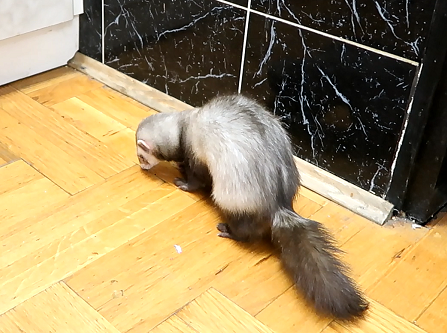
FERRET BEHAVIOR FACTS
- Ferrets are silent animals, they vocalize only when they are extremely happy or in a really bad mood. But, don’t assume they won’t produce any sound. When a ferret is exploring, you will know it. Exploring includes tackling stuff, jumping from the sofa to the table, falling, crunching with plastic bags… When your ferret is exploring and you can’t hear anything, that often means trouble.
- When your ferret is extremely happy it will vocalize and ferret owners call it DOOKING. Dooking is usually connected to leaping, running into things, and acting all wild which is called a FERRET WAR DANCE.
- In very rare cases, a ferret can wag its tail. It happens when a ferret is young and very excited. Usually, you can hear the tail wagging when one ferret is in the tunnel and the other is waiting in front of the tunnel for it.
- When your ferret is mad or scared it will hiss, just like snakes. Hissing is its way of warning others to be careful or it will bite. A ferret can hiss on you, another ferret or other pet, anyone who can make it feel scared or mad.
- Of all ferret behavior facts, this is one of the cutest and it is connected to exploring unknown areas. It is called a bottle brush tail and it occurs when a ferret enters an unknown area (it can be another room in your home) So, what a bottle brush tail actually means? It is when all hair on the ferret’s tail stands up and its tail looks like a brush for cleaning bottles. Ferrets do that when they are entering an unknown area to make them look bigger than they really are. In more extreme situations every hair on the ferret’s body will stand up which will make it very fluffy. They are trying to look big and badass but they actually look really cute and fluffy but don’t tell them that.
- Ferrets have more common behavior to cats and dogs than to other small animals. Even though people have cages for them, ferrets need exercise outside of the cage for at least 4 hours a day. People often release them out of the cage when they can be supervised or in the special ferret-proofed room.
- Ferretproofing is one term you have to learn if you are planning to get a ferret. It means to secure a room where your ferret will be because they love to explore and they can get hurt while doing it. Ferretproofing means to close the cabinets with child locks, tape over holes in the furniture, remove all fragile things from tables, remove plants… Ferretproofing is a 24/7 job for making your ferret safe. When you think you did everything you can to make it safe, your ferret will show you otherwise.
- Socks, keys, gloves, slippers….. Those are all favorite things to stash which ferrets do often. Don’t be surprised if one day you find a stash of dirty socks and paper tissues under the couch.

FERRET FACTS AND CARE
- It is hard to determine the average life span of a ferret because their quality of life has improved in the past 30 years with the correct education of every ferret owner. A few years ago it was about 6 to 8 years but today it is from 8 to 10 years, sometimes even more.
- One of the things which have improved the ferret’s life span is a knowledgeable veterinarian. Ferrets are still considered ”exotic” pets and sometimes is hard to find a good ferret vet. Check with your local ferret shelter where is the nearest ferret vet they can recommend.
- If you are thinking of getting a ferret, make sure you are able to help your ferret during hot weather. Ferrets can’t sweat, which can lead to overheating and heatstroke. Fill your ferret’s cage with frozen bottles, wet towels, and always give it fresh cold water.
- Since ferrets are a part of the mustelid family, they do have anal sacks to produce a bad odor when in danger. But, ferrets are pets, meaning they rarely come in dangerous situations, so ferrets release smell bombs very rarely.
- Ferrets are actually very clean animals and most of the time they will clean themselves. They can even wash their paws and head. It isn’t recommended to bathe a ferret, only when he is really dirty (mud, dust, or something similar).
- Their hearts beat 200-250 beats per minute, the average human heart rate is 60-100 beats a minute.

FACTS ABOUT FERRETS AS PETS
- Ferrets are more popular than you think. They are considered 3rd most popular pet in the USA, right next to cats and dogs.
- If you assume that ferrets are wild animals, think again. Ferrets are domesticated for so long that they don’t have fear towards humans.
- Now, one ferret habitat fact. Ferrets are domesticated 2,500 years ago which means that today ferrets would have a hard time surviving outdoors. With their lack of fear and inability to endure heat and dehydration, ferrets wouldn’t survive in the wild.
- The only feral colony of ferrets in the world and is in New Zealand. Funny thing is that those ferrets were domesticated and brought to NZ to decrease the number of rabbits in the wild.
- One thing why people always assume ferrets are wild animals is their nutrition. Ferrets are obligate carnivores and their nutrition consists of raw meat, organs, and bones. They aren’t capable of digesting fruit and vegetables, so they are a big NO-NO for ferrets.
- Most ferrets have to learn not to bite, but that isn’t because they are afraid, they bite because they are communicating that way – they want to play with humans. Ferrets have very thick skin and when they bite each other, they don’t feel a thing. We, on the other hand, feel their teeth very much and we have to teach them to stop.
- Ferrets aren’t just played and mischief all day, in the past they were quite useful. People used them to drag wires through tunnels on many occasions.

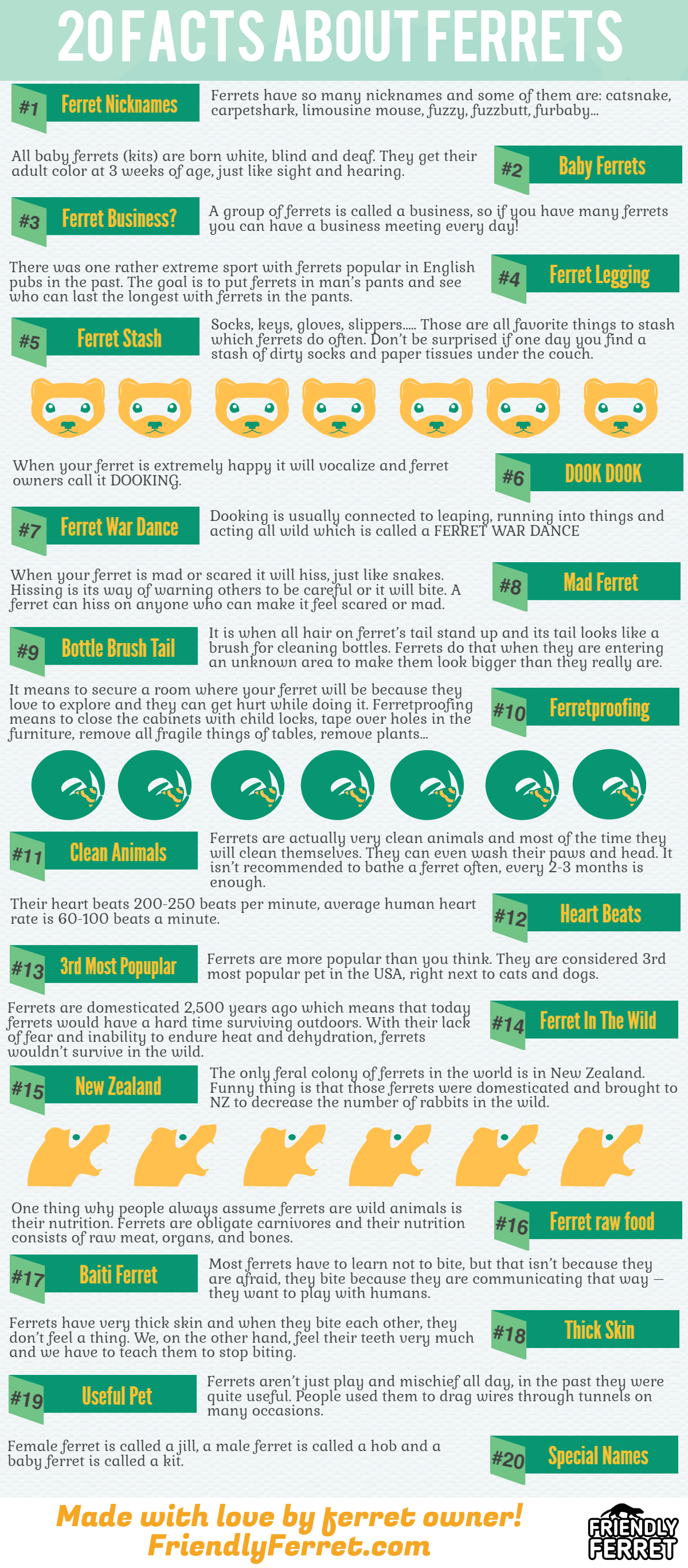

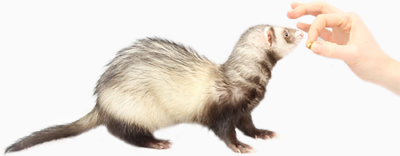
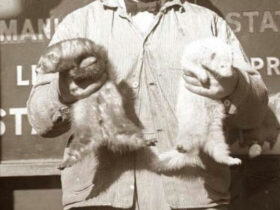

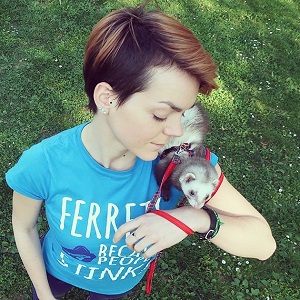

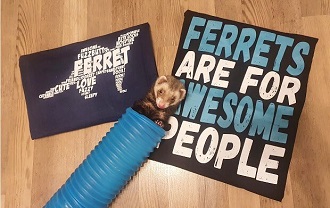
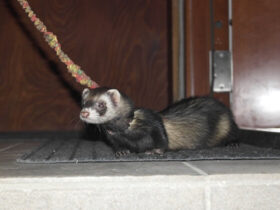



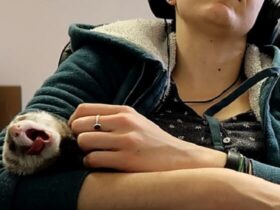
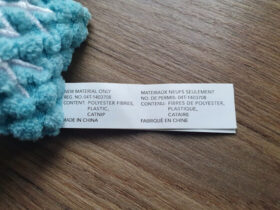
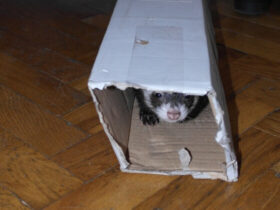
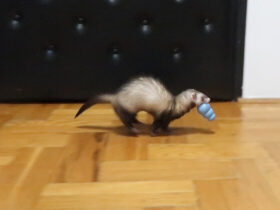


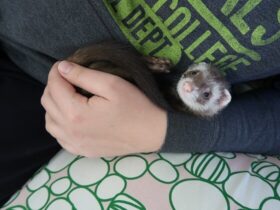

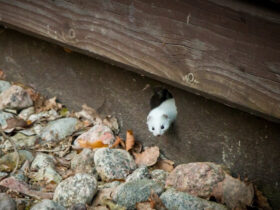


That was an informative and interesting blog. I’ve had ferrets over a decade and still learned something. It was a fun read. Thank you!
Mary
Thank you for your kind words!
I am fascinated with Ferrets.
Yes, I agree, they are fascinating!